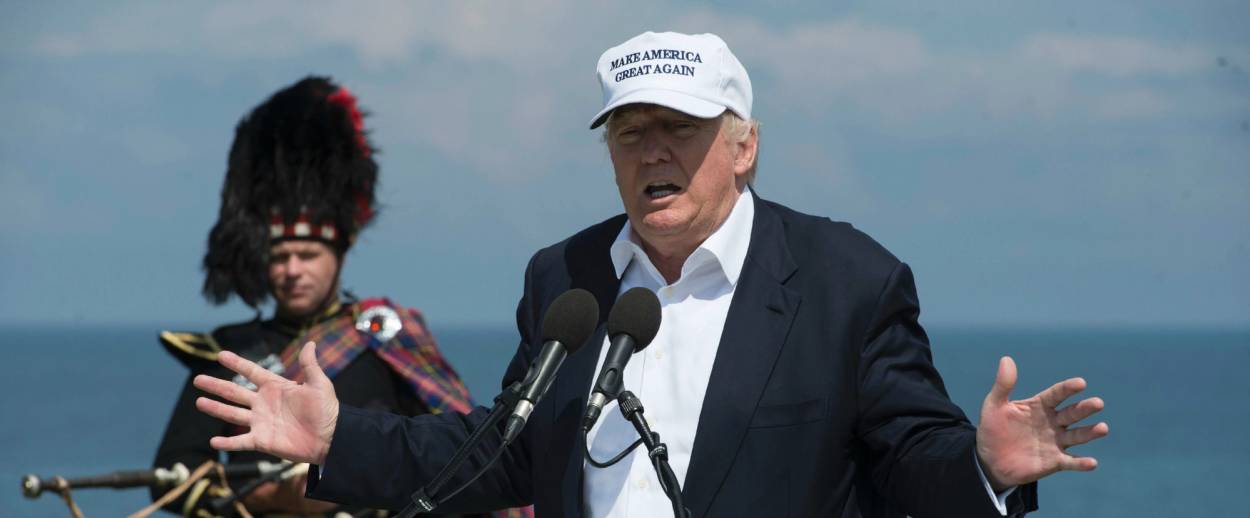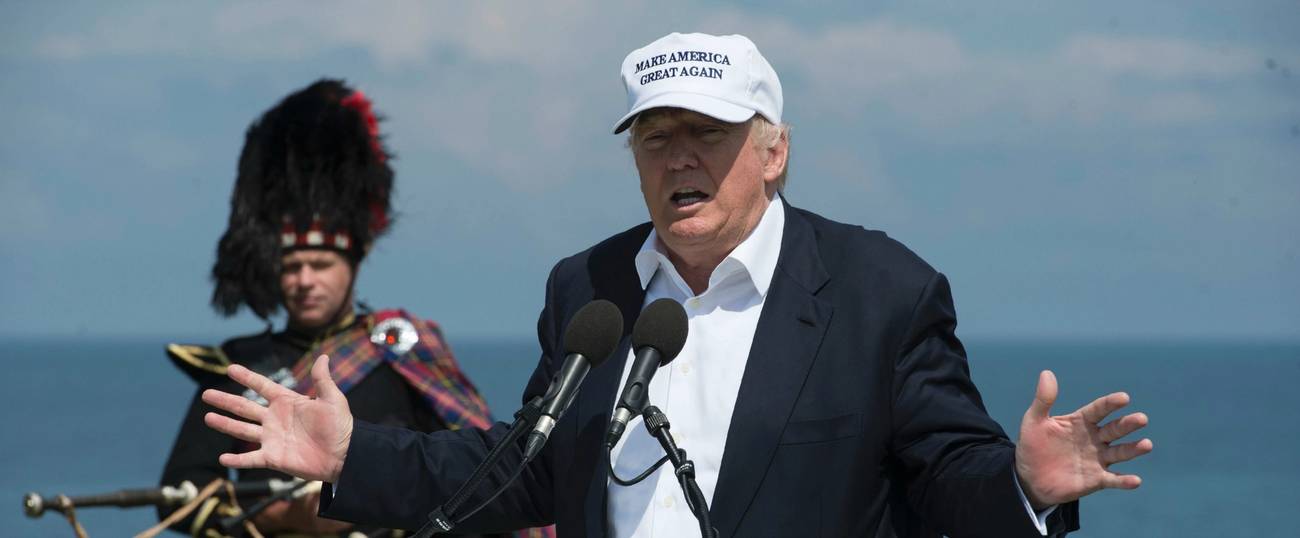Trump Needs Adelson’s Fortune More Than Ever
As intra-party support for Trump dwindles, the cash-strapped presidential hopeful looks to one of Israel’s greatest proponents for financial support




Donald Trump was in Scotland Friday, reopening the newly renovated Trump Turnberry golf resort and holding court on Britain’s impending departure from the European Union. He’ll have his work cut out for him when he gets back to the United States: According to a Federal Elections Commission financial disclosure form released earlier this week, Trump’s presidential campaign has a mere $1.3 million on hand, a lesser war chest than any number of members of the U.S. House of Representatives.
Trump’s fundraising challenges will be steep, but he has one famously generous donor on his side. With little apparent interest from much of the Republican donor class, Trump may have to lean more heavily on multi-billionaire casino magnate and Trump endorser Sheldon Adelson, whose staunch views on Israel could be newly relevant in this coming presidential contest.
Money-wise, trump is facing a big structural hurdle because he’s simply turned off too much of the Republican fundraising base. Former presidents George H.W. Bush and George W. Bush have already declined to endorse Trump. The same goes for Mitt Romney, the former Massachusetts governor and 2012 GOP presidential nominee, who delivered a stinging rebuke to Trump during a March 3 speech. Trump hasn’t just lost their votes. His low fundraising totals suggest that he’s lost their formidable donor networks as well.
Romney raised $76 million in June of 2012, beating out President Barack Obama by $16 million. That’s an astonishing contrast to May of this year, when Trump amassed a mere $3 million. It isn’t just that Trump seems uninterested in raising money, or that he wants to farm out all the heavy-lifting to the Republican National Committee, or believes that running a lean operation somehow helps his case against Hillary Clinton. From the looks of it, Trump has alienated too many of the party’s funders to be able to finance a viable national presidential effort.
But he hasn’t alienated all of them, and Trump still counts the support of the single biggest political spender in the American Jewish world. In May, Adelson, citing the dangers of continuing Barack Obama’s policies for another presidential term, endorsed the real estate developer’s presidential bid. Adelson didn’t seem to mind that in an October 2015 tweet, Trump had accused Adelson of trying to mold Marco Rubio “into his perfect little puppet.”
Adelson reportedly spent an astonishing $155 million during the 2012 election cycle, including $30 million for Romney’s super-PAC. In 2012, Adelson was a big spender in one of the most expensive campaigns in history. This year, he’s liable to be the dominant figure within a much smaller donor pool.
The 2012 election gives a sense of what that could mean as this year’s campaign unfolds. In the last presidential election, Israeli Prime Minister Benjamin Netanyahu was frequently accused of trying to influence the election on Romney’s behalf. The former Massachusetts governor traveled to Israel in July of 2012, delivering a speech in which he made controversial statements about the connection between Palestinian culture and disparities in living standards between Israelis and Palestinians. Adelson was part of the reason issues surrounding Israel took on such a partisan flavor in the last presidential election. It’s a pattern that’s in danger of repeating itself: Adelson owns the reliably pro-Netanyahu Israeli newspaper Israel HaYom, which has already taken steps to try to improve Trump’s image for the Israeli public.
Adelson’s views on Israel are well to the right of much of the American Jewish community—he famously broke with AIPAC over the organization’s support for the Gaza disengagement and the peace process more generally. While Adelson hasn’t had a whole lot of success getting his favored candidates elected, his deep pockets have had the residual effect of bringing somewhat non-mainstream views on the Israeli-Palestinian conflict (at least within a U.S. context) closer to the center of the U.S. discourse while utilizing Israel as a partisan issue to a greater degree than in previous presidential elections. Adelson’s approach could be an even bigger feature of the election this year, assuming he remains one of the few major donors willing to support the Republican candidate for president.
Previous: Trump and Adelson, Sitting in a Tree…
Armin Rosen is a staff writer for Tablet Magazine.